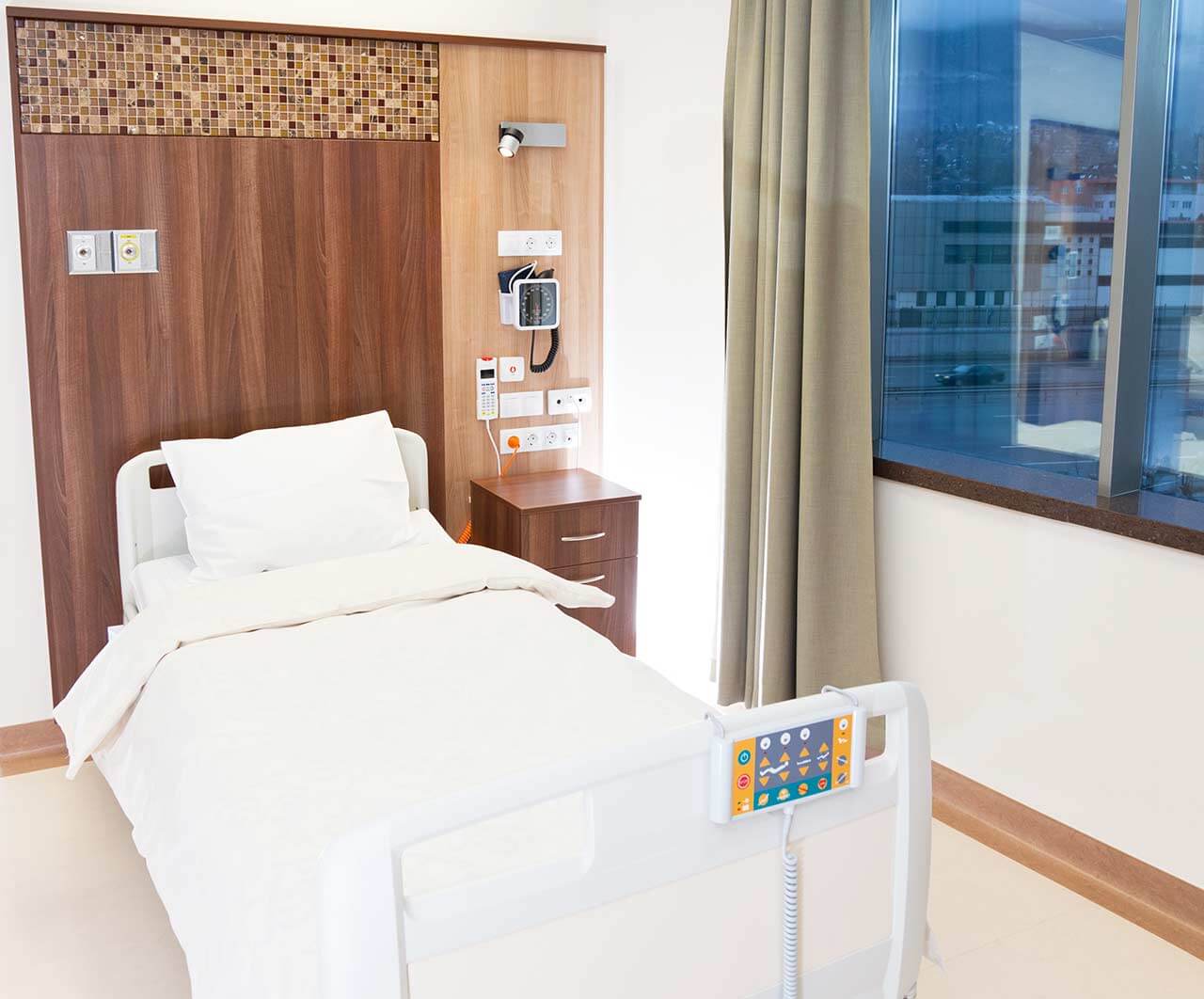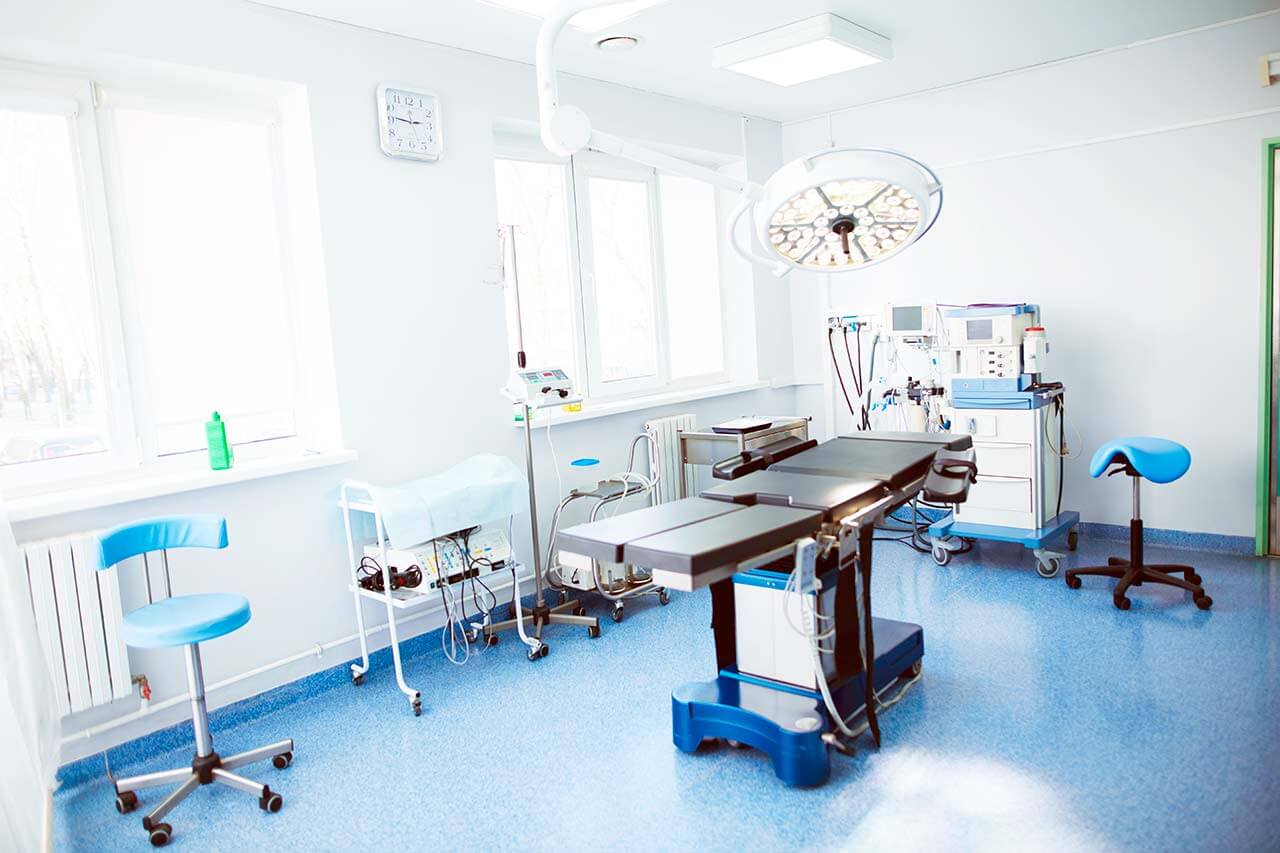
The program includes:
- Initial presentation in the clinic
- clinical history taking
- review of medical records
- physical examination
- laboratory tests:
- complete blood count
- general urine analysis
- biochemical analysis of blood
- inflammation indicators (CRP, ESR)
- indicators of blood coagulation
- TSH-basal, fT3, fT4
- tumor markers (CEA, CA 15-3,CYFRA 21-1, NSE)
- CT planning of radiation therapy
- full course of conventional radiation therapy
- symptomatic treatment
- cost of essential medicines and materials
- nursing services
- control examinations
- consultations of related specialists
How program is carried out
During the first visit, the doctor will conduct a clinical examination and go through the results of previous laboratory tests and instrumental examinations. After that, you will undergo an additional examination, including complete blood count, laboratory assessment of liver and kidney function. Based on the received results, the physician will conduct radiotherapy planning with the help of CT or MRI, make the permanent tattoo marks on the skin and conduct CT simulation in order to assess the accuracy of the rays and the radiation dose. If necessary, related medical specialists will be involved in the elaboration of a treatment regimen (tumor board).
Radiation therapy is carried out as the day hospital procedure, without mandatory admission to the hospital. At each visit, the physician will assess your general condition and the marks on the skin. After that, you will be placed in a shielded radiation therapy room, on a special table.
Each radiation therapy session lasts less than half an hour (including preparation). All this time, doctors and nurses are monitoring your condition, you can communicate with them through a loudspeaker. The procedure is completely painless. Depending on the planned course of treatment, you will visit the hospital from 1 to 3-5 times a week.
After the completion of the radiation therapy course, you will undergo control examinations aimed at assessing your condition and efficacy of treatment. After that you will receive the medical report with detailed recommendations regarding further follow-up and treatment. In the future, you will be able to have a distant consultation with your attending physician and schedule the next course of treatment, if necessary.
Required documents
- Medical records
- MRI/CT scan (not older than 3 months)
- Biopsy results (if available)
Service
You may also book:
 BookingHealth Price from:
BookingHealth Price from:
About the department
The Department of Radiation Oncology and treatment with CyberKnife at the the Medicana International Ankara Hospital offers cutting-edge methods of radiation oncology for the treatment of all types of tumors. The department specializes in intensity-modulated radiation therapy, intraoperative radiation therapy, the most advanced radiation therapy (VERSA HD), CyberKnife treatment, brachytherapy and other treatments. The department has at its disposal the state-of-art equipment, including low- and high-energy linear accelerators LINAC, etc. The Chief Physician of the department is Prof. Dr. med. Kaan Oysul.
The department has all the most advanced medical technologies to provide diagnostics and treatment. These include, for example, radiotherapy with the VERSA HD new-generation linear accelerator, MONACO TPS treatment planning system, cone beam computed tomography (Cone Beam CT) and PET/CT Discovery IQ system. The combination of PET and CT allows the physicians to obtain cross-sectional images of the desired body regions and monitor the processes occurring in the tissues and organs. PET scanning is effective in the diagnostics, treatment and follow-up care of patients with tumors, heart diseases (coronary artery disease, heart attack), brain diseases (brain tumor, epileptic seizures), etc.
The department’s diagnostic range of services includes the following options:
- Cone beam computed tomography
- PET/CT scanning (Discovery IQ)
- Gamma camera (for the diagnostics of thyroid, spleen, liver, lung and brain cancers)
- Scintigraphy (brain, liver, kidneys, heart, bones, tear ducts, lymphatic circulation, stomach, intestines, parathyroid glands, lymph nodes, testicles and salivary glands, etc.
- And other diagnostic options
The department’s most important therapeutic options include intensity-modulated radiation therapy (IMRT), intraoperative radiation therapy (IORT), CyberKnife treatment, brachytherapy, etc. The IMRT technique allows the physicians to individually determine treatment intensity for different body areas. This method is successfully applied in the treatment of prostate cancer, head and neck tumors, breast, thyroid and lung cancers, as well as gynecologic, liver, brain tumors, lymphomas and sarcomas. Moreover, IMRT is also an important option in the treatment of pediatric tumors.
In the field of breast cancer, one of the treatment options is intraoperative radiation therapy. The IORT method has many advantages in terms of time and cosmetic aspects. This method can also be used in the treatment of some abdominal tumors, for example, in pancreatic cancer, gastric, colorectal cancers, soft tissue tumors, etc. Another important method is the CyberKnife technology, which is designed to treat lesions located at any part of the body. The CyberKnife procedures are conducted under constant imaging guidance, and therefore the patients are provided with the best possible safety and treatment accuracy.
The combination of the advanced medical experience and cutting-edge technologies ensure very high rates of treatment efficiency. The patients of the department can be sure that they will receive here medical services of the highest quality.
The department’s therapeutic range covers the treatment of the following diseases:
- Brain tumors
- Head and neck tumors
- Esophageal cancer
- Lung cancer
- Colon and rectum cancer
- Pancreatic cancer
- Prostate cancer
- Liver cancer
- Thyroid cancer
- Cervical cancer and other types of gynecological cancers
- Soft tissue tumors
- Lymphoma
- Melanoma
- Tumor metastases in liver and lungs
- And other oncological diseases
Curriculum vitae
Education and Professional Experience
- 1992 Medical Education, Gulhane Military Medical Academy.
- 1995 - 1998 Residency, Department of Radiation Oncology, Gulhane Military Medical Academy.
- 10/1995 - 01/1996 Basic Oncology Course.
- 10/2004 - 10/2005 Specialization in Radiosurgery, University of Pittsburgh, Pennsylvania.
- 04/1993 - 10/1995 Flight Surgeon.
- 11/1995 - 1998 Radiation Oncology Residency Program.
- 1999 - 2005 Clinical Assistant Professor of Radiation Oncology.
- 2004 - 2005 Specialized Neurosurgical Instructor in Gamma Knife Radiosurgery and Stereotactic Surgery, Department of Neurosurgery, University of Pittsburgh.
- 2005 - 2012 Associate Professor of Radiation Oncology.
- Since 2012 Professor of Radiation Oncology at the Medicana International Ankara Hospital, Center for CyberKnife Radiosurgery and Advanced Radiotherapy Technologies.
Memberships in Professional Societies
- Turkish Society of Radiation Oncology (TROD).
- European Society of Therapeutic Radiology and Oncology (ESTRO).
- American Society of Therapeutic Radiology and Oncology (ASTRO).
- Turkish Oncology Group (TOG).
- International Stereotactic Radiosurgery Society.
- Radiosurgery Society.
Photo of the doctor: (c) Medicana Health Group
About hospital
The Medicana International Ankara Hospital is one of the leading medical centers, which belongs to the largest medical network Medicana in Turkey. The hospital incorporates all specialties of the modern medicine under one roof. It particularly focuses on bone marrow transplantation, cardiology, cardiovascular surgery, medical oncology, radiation oncology, CyberKnife treatment, nuclear medicine, kidney transplantation, liver transplantation and IVF services.
With a large total indoor space (about 20,000 sq. km), 215 beds, modern architecture, high-end technology and modern quality management system, the hospital treats both Turkish citizens and many international patients. Every year, more and more patients from Europe, Russia, Northern Africa and Middle East come to Ankara to receive modern medical treatment, which meets the strictest quality standards.
A particular clinical focus is cancer treatment. The hospital has at its disposal state-of-the-art medical technologies, including, multislice CT, PET-CT, MRI ultrasound, LINAC linear accelerators capable of making IMRT, conventional and interventional radiology, nuclear medicine imaging methods and radiation oncology, which allow the physicians of the hospital to provide comprehensive diagnostics and treatment of all oncological diseases.
The hospital has brought together the best medical academic staff in the field of kidney, liver and bone marrow transplantation, etc. All employees of the hospital are constantly looking for new, clinically proven treatments in order to ensure that each patient will receive the best and most appropriate treatment in Ankara.
Photo: (c) depositphotos
Accommodation in hospital
Patients rooms
The patients of the Medicana International Ankara Hospital live in comfortable modern rooms designed in bright colors. A standard room includes an automatically adjustable bed, a bedside table, a wardrobe, a shower, a toilet, and a TV set. There is internet access in the patient rooms. The hospital also provides VIP patient rooms.
Meals and Menus
The patients of the hospital are offered a tasty, balanced three meals a day: breakfast, lunch and dinner. With appropriate indications, there may be provided a dietary or individual menu.
Further details
Standard rooms include:





